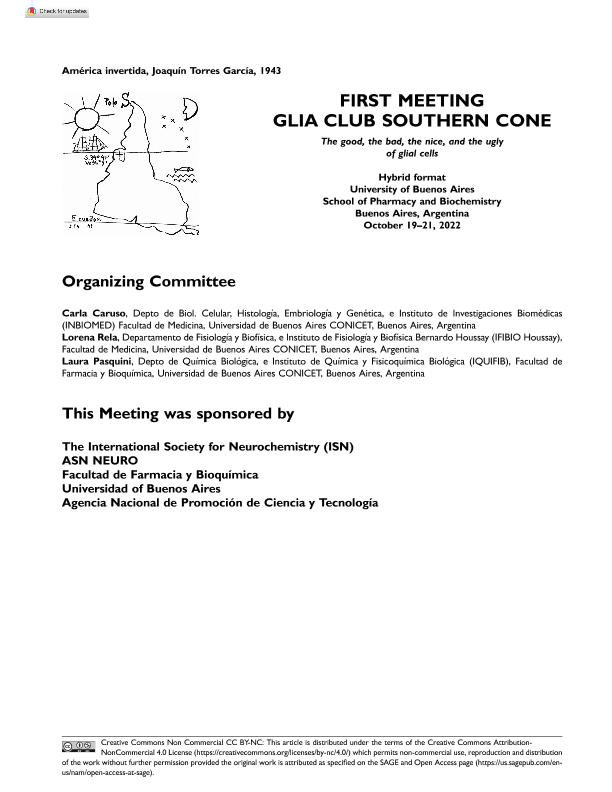Evento
Damaging effects induced by BMAA on Muller glial cells
Tipo del evento:
Reunión
Nombre del evento:
First meeting of the Glia Club Southern Cone
Fecha del evento:
19/10/2022
Institución Organizadora:
Universidad de Buenos Aires. Facultad de Farmacia y Bioquímica;
Club de la Glia;
Título de la revista:
ASN Neuro
Editorial:
SAGE Publications
ISSN:
1759-0914
e-ISSN:
1759-0914
Idioma:
Inglés
Clasificación temática:
Resumen
β-Methylamine-L-alanine (BMAA) is a non-proteinogenic aminoacidic cyanotoxin produced by several cyanobacteria. This cyanotoxin has been linked with the development of neurodegenerative diseases, like Amyotrophic Lateral Sclerosis, Alzheimer, and of some retinal pathologies. In the retina, it induces damaging effects on neurons and in Müller glial cells (MGCs), the major glial cell type, which have crucial roles in preserving normal retinal functionality. We have previously demonstrated that BMAA promotes neuronal degeneration with no protective effect observed by MGCs. In this work, we studied the direct effects of BMAA on MGCs in pure retinal glial cultures. For that purpose, we treated these cultures, obtained from newborn rat retinas, after cells were reseeded, with BMAA (0.4, 1, and 10 µM) at day 1 or at days 1 and 4. Cells were analyzed in either, in a short and in a long-term BMAA exposure of 3 and 9 days, respectively. We evaluated cell viability by DAPI staining and Trypan Blue assays; cellular metabolic activity by MTT assay, and cytoskeleton integrity by staining actin filaments with phalloidin. Our preliminary results showed that in both, short-term and long-term exposure of cultures to BMAA, MGCs displayed nuclear alterations without affecting the viability of these cells. Additionally, BMAA (1 and 10 µM) promoted an increase in the cellular metabolic activity in short-term, but not in long-term studies. Moreover, our results showed that BMAA induced actin network disorganization. Interestingly, in long-term exposure of cultures to BMAA, this toxin-induced an abnormal cytoplasmic growth. In conclusion, these results imply that BMAA induces several alterations in MGCs at the subcellular level without affecting their viability. Hence, these damages may help to understand neurodegenerative damages elicited by BMAA, which affect human health. Our knowledge of the molecular mechanisms involved in BMAA-induced cell damage could help to develop new therapeutic strategies
Palabras clave:
BMAA
,
MULLER GLIAL CELLS
,
DEGENERATION
,
CELLULAR METABOLIC ACTIVITY
Archivos asociados
Licencia
Identificadores
Colecciones
Eventos(INIBIBB)
Eventos de INST.DE INVEST.BIOQUIMICAS BAHIA BLANCA (I)
Eventos de INST.DE INVEST.BIOQUIMICAS BAHIA BLANCA (I)
Citación
Damaging effects induced by BMAA on Muller glial cells; First meeting of the Glia Club Southern Cone; Argentina; 2022; 43-43
Compartir
Altmétricas




